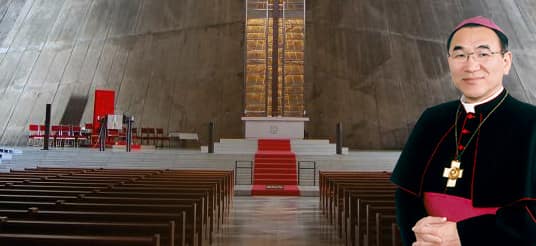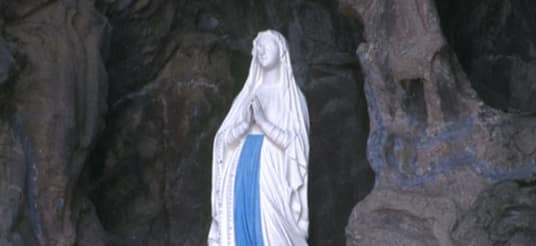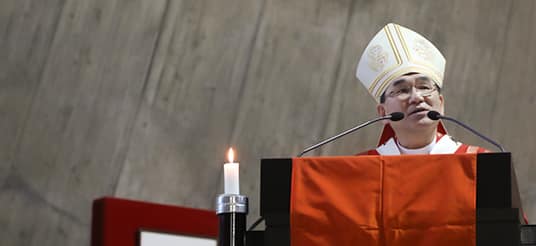Archdiocese of Tokyo

Sermon from the Mass for Peace
6:00 PM, August 14, 2004 At St. Mary’s Cathedral
In the Sermon on the Mount our Lord Jesus said “Happy are the peacemakers”. To work and pray for peace is the most important duty for all Christians, no, for all people. Many people are actually working for peace. This reminds me of the work of Pope John Paul II, the leader of our Church. The Pope is someone who is doing his utmost for realizing peace in this present world. I would like to pray for all of us that we, as Catholics, can follow the work of the Pope, and through learning from the precepts of the Pope, become people who truly are ‘peacemakers’.
At his home town of Nazareth, Jesus Christ quoted the words of the prophet Isaiah and made his first announcement about his mission. “The Spirit of the Lord is upon me, because he has chosen me to bring good news to the poor. He has sent me to proclaim liberty to the captives and recovery of sight to the blind, to set free the oppressed and announce that the time has come when the Lord will save his people.” The work of the Church must continue on from the work of Christ. The Church established by Christ must follow closely his lead, and as one endeavor to realize Christ’s words with the utmost effort. I believe that in progressing in this way, we begin our Christian work of ‘making peace’. However, what is it like to work for peace in today’s world? There are many possible ways. No one can say that some work is unnecessary or that this is the only work worth doing. One must learn what the problems are in today’s world, and then seek out what one should do to solve these problems. Starting from one’s current situation and one’s present position, we must work in many different ways to bring about peace. Today, there was a showing of the film ‘HIBAKUSHA’ with a speech by Ms. Kamanaka Hitomi, director of the film in our Köln Hall. I attended this event, and was surprised by the number of things I didn’t know much about. This has been a learning experience for me. Truly, there are many difficult problems in this world.
Just recently, I was shocked by an awful report I read. The report was about sex-tourism and the trafficking of women and children, which is happening in today’s world. This was distributed by Cardinal Fumio Hamao, president of the Pontifical Council for the Pastoral Care of Migrants and Itinerant People to the Bishops’ Conference of Japan. This report states that almost one million children are forced into prostitution every year. “Prostitution tours” are organized and carried out all over the world. The destinations for these are usually the poor countries of Asia, targeting vulnerable women and children. And the fact that women and children are trafficked overseas from poor counties is well documented. Again I stress that sex-tourism takes place in economically disadvantaged Asian countries. For example, 5000 to 7000 women and girls are trafficked to India from Nepal and Bangladesh every year. This kind of thing must be prevented. But we cannot deny what is happening in reality. This exploitation is one of the consequences of what we call the North-South problem. Countries of the South are very poor economically and extreme poverty is the major cause for human trafficking. On the other hand, developed countries are economically rich but show a poverty of spirit. Their humanity has been poisoned and corrupted by consumerism.
This inhuman activity is far from the Kingdom of God. The women and children, who have been forced into prostitution or have been trafficked for sexual exploitation, must be freed from their slavery. Once again they are to be treated as full human beings and a healthy livelihood must be guaranteed them. Parallel to this, the people involved in prostitution and sexual exploitation, whether actively or passively, must recognize the evil of the situation and to acknowledge their own sin. Their hearts need to be turned around and so work to atone for the damage they have done. Eradication of this evil requires the great effort of many people. And so we cannot be indifferent to what is happening. We probably are not actively involved, but we can be passively responsible for what is going on. If we are aware of evil and take no action to combat this we are neglecting our Christian duty as ‘peacemakers’.
Why have these kinds of evil prevailed in our world? This world has been created by humankind. This world is ruled by structural injustice, the consequence of human sin accumulated over time. As this world was created through human action or inaction, it is our responsibility to work out a solution to these problems. We have to change the structure of human society, but is it possible for us to accomplish this?
Throughout history, many ideas and plans about confronting the world’s structural injustice have been proposed. But these have all ended up unsuccessfully. The reality of human sin is too deep-rooted and too far-reaching. This is a matter of structural sin and evil, of being in a state of rebellion against God’s rule. Therefore, if the rule of God does not prevail over all, ‘a new heaven and a new earth’ will not be realized. The realization of this new world can only be achieved through the grace of God.
From October 9th to 11th this year, the ‘30th Annual Justice and Peace National Assembly’ will be held in Tokyo. The theme of this assembly is ‘Another World is Possible!’ Our present world is a world where women and children are trafficked for sexual exploitation, where innumerable people are starving, while an astronomical amount of public money is budgeted for spending on war. Is there nothing that can be done about this world? Is this world beyond our efforts to change it? Will the world just continue as is? Or is there a possibility for another world? What kind of world would it be like? It should be a world where evil is eradicated, a world where everyone is treated with respect, and their unique, invaluable human existence is valued. Is this kind of world possible? My answer is “Yes, it is possible”.
In Ms. Kamanaka’s speech, she gave the following answer to the question-’What in the world can we do in such a situation?’ Her answer was the one word ‘sympathy’, that is sympathy for the pain and sorrow of the suffering and grieving peoples. Many children are suffering In Iraq. To feel sympathy for the pain of these children and for the anger of their families, we need to be deeply concerned ourselves. This is something that we are all able to do. In 1995, the 50th anniversary of Japan’s defeat of World War II, Japan Bishop’s Conference proclaimed a message entitled ‘Decision for Peace’. This message discussed what we must do to further peace and referred to the importance of exchange among Asian peoples. The experience of meeting people face-to-face and so realizing our common humanity is very important for understanding the pain and grief of one another. We can then take the pain and grief within and let it become part of own selves.
Today’s reading was from St Paul’s Letter to the Ephesians which refers to the cross of Christ. By the cross, Jesus destroyed the hostility of people. We too as Christians, have to carry our cross on our shoulders. I believe to share in the pain and grief of others is one way of shouldering the cross. Sharing the pain of each other is the Gospel way of living.
To some extent, we already know what ’another world’ is like. At lease, we can say, we have been given a glance of it. It is a world already partly realized. It is the Kingdom of God that began to be built with the arrival of Jesus Christ. The Crucifixion was a victory over sin and evil. The victory of the cross opened the gates of the world to the Resurrection. This other world is the brilliant world of the Resurrection-the world of Glory. The mission of the Church is to be the sign of the arrival of God’s Kingdom, to witness to the Resurrection of Christ. This is our mission. There is no Resurrection without the cross. We as Church must carry our own cross. And the only way that we can truly fight against evil is by shouldering our cross.
Let us renew our determination to follow our Lord, Jesus Christ, who brought peace by his cross. And especially today, let us pray devotedly to our Blessed Mother of the Assumption, so that through her intercession we will be granted the necessary wisdom, courage and strength to accomplish the mission of the Church.





